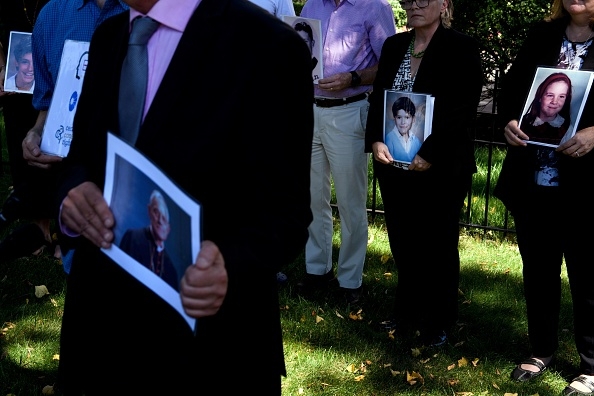You have /5 articles left.
Sign up for a free account or log in.

Activists speak outside the Vatican's U.S. embassy about sexual abuse in the Catholic Church
Getty Images
In May, 51 scholars -- including Judith Butler, Cathy Caruth, Joan Scott, Gayatri Spivak and Slavoj Zizek -- signed a letter to the president and provost of New York University in defense of Avital Ronell, a professor of German studies and comparative literature at the university, about her investigation under Title IX for the alleged (now evidenced) sexual harassment of Nimrod Reitman, a former graduate student of Ronell's. The letter opens with a testament by its signatories of Ronell's service to the university and intellectual life, her contributions to her fields of study, and her successful mentorship of students who now hold positions at leading research institutions.
The letter further testifies to the "grace, keen wit and the intellectual commitment of Professor Ronell." In addition to asking that the reviewers of her case approach the material with an awareness of her credentials and that she receive a fair hearing, the writers also "deplore the damage that this legal proceeding causes [Ronell]" and object "to any judgment against her." In short, Ronell's accomplishments as an academic are provided as the primary proof that a feminist woman scholar could not have harassed a male graduate student.
The letter uses a rhetorical strategy that is contextually specific: women and female scholars are caught in a double-bind. In universities, as elsewhere, women are much more likely to be harassed than to be the harasser and, at the same time, women are often unfairly disciplined when they are the subject of investigation under protectionist policies. The letter cannot be interpreted without acknowledging the context of sexism, queer-phobia and misogyny that inform the writers' concern for their colleague. Yet the logic of using character evidence to discredit an accusation that a person has abused her power is deeply flawed -- to the point of being ironic.
Many of the accolades in the letter are more likely to bestow increased power on institutions than to diffuse it. The letter attempts to discredit any finding against Ronell by anticipating the ways Title IX could be unfairly applied to her, while simultaneously denying that women and sexual minorities are capable of harassment. Such arguments sidestep an important implication of gender equity: to deny that women are never culpable also denies us our full humanity. In light of the #metoo movement, public conversations about sexual harassment need to dispense with the familiar and easy appeal to gender essentialism; women and queers are capable of abusing those whose minds and work they shape.
And that is why defenders of Ronell should look to what's happening in Pennsylvania. The state has just released a grand jury report on the widespread systemic abuse of children and adults within the Catholic church. The report documents thousands of cases of sexual abuse by church authorities against congregants, many of whom were children at the time. While abuse in the Catholic church may not be news in itself, some survivors have suggested that priests and bishops believe they have a benevolent right to their abusive behaviors. Sexual abuse, some have testified, is part of church culture.
It's happenstance that the Pennsylvania grand jury report coincides with the coverage of the Ronell case, but let it also be instructive. The letter defending Ronell could just as easily be read as a defense of her benevolent right: if the long list of academic accomplishments does not, in fact, prove that a person is incapable of harassment, perhaps it unconsciously expresses the belief that academic achievement matters more than how we treat human beings. Ronell's defenders stop short of suggesting that harassment could not have occurred because the actions described by Reitman are actually the prerogative of the academic elite.
The university, like the Catholic church, are both longstanding institutions that are defined in part by the power structures they reproduce and maintain. Sexual abuse, harassment and assault are about an exercise of power -- not about one's sexual orientation or charisma. People who are willing to dismiss the possibility that a female academic is capable of sexual harassment should look to the uncovering of the Catholic sexual abuse scandal -- its scale and severity -- to understand how denial and the perpetuation of dehumanizing practices are sometimes at the center of institutional culture.
Given that universities are expected more than ever to justify their value in terms of student learning and well-being, the Pennsylvania grand jury report foreshadows an overdue need in academe to define how the principle of academic freedom applies to supervisory relationships -- that precarious emotional and conceptual space where, if all goes well, entire worlds are created. Ronell's defenders anticipate a loss for the academic community if Ronell's work were to be discredited because of "any judgment against her," and I agree that such a finding does constitute a terrible loss for all who know Ronell and engage with her work. But the suppression of a negative finding to protect a person in a position of authority would be no less disastrous. If intellectuals truly value the kinds of contributions Ronell has made to scholarly inquiry, then we also need to take seriously what kind of loss results from abuse of students who depend on their advisers to help them find a future as intellectuals.




